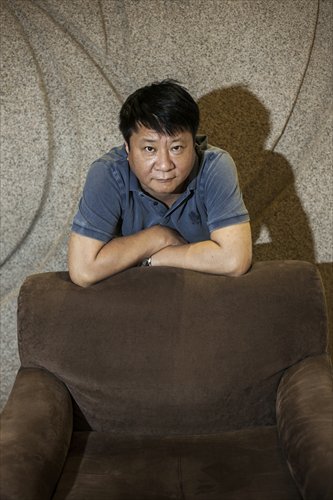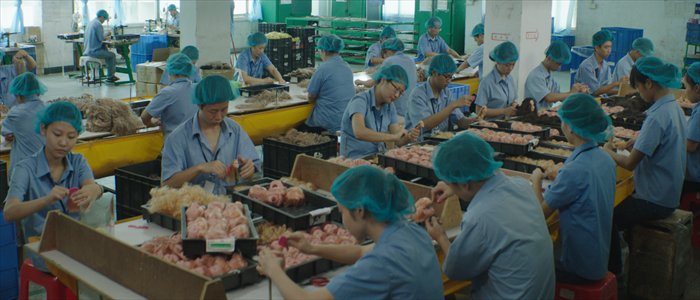HOME >> ARTS
From life to film
By Wei Xi Source:Global Times Published: 2014-9-16 21:08:02
Director shares the story behind ‘Factory Boss’

Zhang Wei, director of Factory Boss Photo: Li Hao/GT
The first time I met Zhang Wei, my first thought was that he didn't look like what I expected from an indie film director who enjoys making humanist films.
Wearing a polo T-shirt and a pair of slippers, the 49-year-old director was nothing like most academic filmmakers with their sharp opinions, or common businessmen who often show up for interviews dressed in fine suits.
Early this month, Zhang's latest film work Factory Boss won its lead actor Yao Anlian a Best Actor award at the 38th Montreal World Film Festival. The only Chinese film taking part in the competition section of the film festival this year, the award also marked the first time in over the past decade that a Chinese actor has won the festival's Best Actor award.
Also garnering the attention of domestic and overseas audiences are the subjects the film covers: the Chinese manufacturing industry, clashes between factory workers and bosses, investigative reporters and conflicts between Western capitalist businesses and third-world manufacturers.
While any one of these subjects would be worthy of discussion on its own, Zhang includes them all in Factory Boss.

A scene from Factory Boss Photo: Courtesy of Shenzhen Huahao Cultural Media Co.
Story behind the story
A person who seldom leaves home now, Zhang said he gets most of his inspiration for films by reading.
"I pay attention to news stories and like to read editorials and critics," Zhang told the Global Times, explaining that economic and political newspapers and magazines are his preferred choice. "I take note of stories that touch my heart and then follow my instincts to adapt them to film."
The inspiration for Factory Boss came from the Foxconn incidents in 2007, when media described this leading Shenzhen-based private enterprise as a "sweatshop," causing the company to lose orders from Apple in the US. Though the company later won its lawsuit against Chinese media, the constant suicides of Foxconn workers kept the company firmly in the public's attention.
Placing the story against the background of 2010, when the Global Economic Crisis was sweeping throughout the world, Factory Boss focuses on toy company owner Lin Dalin (played by Yao) and his struggles in the face of rising production costs.
The boss character that Lin plays is not a portrayal of any real entrepreneur, but a collection of many, according to Zhang.
This image won sympathy from the Chinese community in Montreal after Factory Boss was screened at the film festival. "Many of them, who are also entrepreneurs, came to hug the actor, crying about how the character reflected their own bitter stories," Zhang said, well-pleased.
Despite the warm reception, local media still found the film somewhat controversial.
Many questioned whether the film is merely making an excuse for the decline of China's manufacturing industry by putting the blame on the West, while others wondered if the director was trying to push some sort of economical or political agenda.
"I'm only a director, not a politician or economist. I'm unable to raise the theme of a film to such high levels," Zhang explained.
Favoring a documentary film making style, Zhang said he tried to get as close to reality as possible in Factory Boss. As for the situation in Guangdong Province today, which was also of interest to Canadian media, Zhang explained that while there are still pressures many issues have already been solved.
Directing from experience
Considering that Zhang was also once involved in the manufacturing industry, I asked whether Factory Boss reflects his own story. Zhang was quick to answer, "I find many reporters like to ask this question. But for me, life and film are different."
Zhang has lived in Shenzhen, Guangdong Province, for more than 20 years now. A costal city, its economy boomed after it was designated as a special economic zone by the Chinese government during the 1980s. Keenly aware of what goes on in local factories, Zhang said the film does include some of his experiences in the industry.
Born in the mid-1960s, Zhang lived through some of Chinese society's biggest changes, such as the Cultural Revolution (1966-76) and the later reform and movement. These changes brought him a successful career but at the same time kept him from his dreams.
"I dreamt of being a painter as a child and a writer while a young man. There was a period of time in the 1980s, amongst my confusion and loneliness, in which I wanted to find a way to express myself," Zhang said, adding that in the end he had to put aside his dreams to make a living.
Once he had reached a certain level of economic stability, Zhang said he began investing in films, but later ultimately realized that it was much more interesting to make his own.
"It was like giving your money away so someone else could play mahjong, no matter if you win or lose, you don't get to have any fun," Zhang joked. "I also found it was easier to express my own thoughts if I did things myself."
Factory Boss is Zhang's third film. His directorial debut, Beijing Grassland (2010), was about an young African man's dream of achieving it big in Beijing. Shadow, a film about the struggles a traditional shadow puppet player faces in an increasingly modern society, followed.
He also has a few projects lined up now that Factory Boss is finished, such as one film about Tibet and another focusing on a mother raising an autistic child.
Although compared with film making, Zhang feels writing is a lonely job, he still plans to get back into literature when he is older. "When it comes to expression, there are still certain limits in film. Literature is much freer."
Posted in: Film